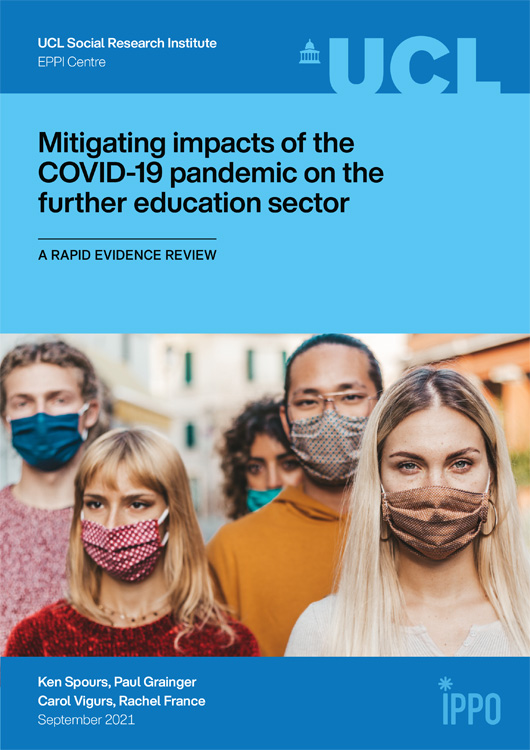Rapid Evidence Review: The impact of the pandemic on the UK Further Education sector and its students

This review was commissioned by the UK Government’s Department for Education (DfE) following a recommendation from the Scientific Advisory Group for Emergencies (SAGE). It was managed by the EPPI-Centre at UCL. Click here for the full review
- IPPO Rapid Evidence Review summaries: Schools / FE / HE / Parents & carers
Summary of findings

This IPPO rapid evidence review pulls together evidence from 53 studies on harms and 10 systematic reviews of evidence on mitigation strategies relating to the impact of closures and disruption of Further Education institutions of all types during the pandemic. As some of these data were relatively weak, the review also drew on interviews with eleven people from relevant organisations including colleges and examination bodies.
The UK Further Education (FE) sector includes general FE colleges, sixth-form colleges, work-based learning providers, adult institutes, and specialist and technical institutes. A wide range of FE students have therefore been impacted by institution closures and reduced access during the pandemic – both in terms of learning loss and also their general wellbeing, with particular challenges for those from more vulnerable and/or deprived communities.
Impact on the uptake and completion of apprenticeships
Closing FE colleges during the pandemic has meant declines in both:
- the number of young people completing existing apprenticeships in 2020 – down to 25% from 37% in previous years, because their skills acquisition needed to progress to the next stage could not be verified; and
- the number of young people starting new apprenticeships – down by 46 percentage points in 2020 compared with 2019, with particular falls within the health and social care, business management and hospitality sectors.
Our review also found evidence of a decline in the awareness of apprenticeships during the pandemic among potential new students.
Impact on the pursuit of vocational qualifications
Changes to modes of learning, assessment and qualifications have affected people taking vocational qualifications more than those taking GCSEs and A-levels. One key issue is that online learning is not possible for some aspects of vocational courses, including assessment:
- Our review highlights a decline in the uptake of vocational qualifications such as engineering and construction during the pandemic.
- Pass rates in 2020 were lower than in 2019 across a range of FE vocational courses including engineering and construction. In contrast, over a similar period there were significant increases in A-Level pass rates, averaging 10 percentage points.
- Among FE students aged 19+, there was also a decline in course retention rates (-1% on the previous academic year).
Impact on particularly vulnerable cohorts of FE students
The sector caters for a wide range of students including the most disadvantaged and vulnerable learners, providing English for Speakers of Other Languages (ESOL), and basic skills programmes and independent living skills for learners with additional learning needs.
- Pass rates in ESOL were 5.7% lower in 2020 compared with 2019.
There is some evidence of widening attainment gaps across the FE sector for already disadvantaged young people, owing to the pandemic. More specifically:
- There is evidence of vocational disruption from a rise in youth unemployment over the pandemic, particularly for those in low-paid jobs.
- Among FE students aged 19+, the decline in pass rates has been most notable in students from Black, Asian and minority ethnic communities (3-4%, compared with 1.3% for White students).
- When FE student pass rates are mapped against indices of deprivation, this reveals a ‘class gap’ of 7% between most and least deprived.
- Vulnerable learners were found to have been disadvantaged by the absence of close teacher support, loss of study habit and discipline, a loss of ‘agency’ and increased feelings of alienation.
Impact on the mental health and wellbeing of FE students
There is evidence of worsening mental health and wellbeing among young people worried about the impact of the pandemic on their course performance, particularly on vocational courses, opportunities for work placements, and future job opportunities. In one survey reviewed, 24% of young people claimed the pandemic had ‘destroyed’ their career aspirations.
In addition, many young people experienced negative impacts on their social life and family life. With regard to mental health, 41% of colleges report a significant increase in mental health referrals, and 90% of colleges saw an increase in students diagnosed with mental health conditions in the past 12 months.
Mitigation strategies
Four models aimed at helping students to catch up on their learning are being explored by institutions that deliver a high proportion of technical and vocational learning. However, all are resource-heavy and would rely on the good will of teaching staff:
- A ‘fourth term’ where an additional semester is added to the academic year.
- A delayed start for progressing students in order to complete the learning and assessment of existing students.
- A doubling-up of students so that the older cohort, in effect, repeats a year.
- A programme of in-work assessment whereby instruction and assessment are organised for a student post assessment.
Mitigation strategies for the FE sector largely depend on the speed and scale of economic recovery – for example, to increase the number of good quality apprenticeships – as well as multi-agency joined-up measures coordinated locally.
Interventions that incentivise employers to provide high-quality apprenticeship programmes may prove beneficial for longer-term labour market engagement of young people.
A policy solution that would aid recovery could involve systemic reform of funding along with guarantees for all young people and adults of training provision. In addition, personalised support packages could help support disadvantaged young people both into employment and in accessing post-16 education.
Other considerations for policymakers
Questions emerging from this assessment of the pandemic’s impact on the FE sector include:
- What are the most urgent needs with regard to the UK’s apprenticeship schemes, given the highlighted declines in awareness, uptake and completion of such schemes during the pandemic?
- To what extent has COVID-19 highlighted a growing gap between the FE and Higher Education sectors – including in terms of support for those from the most deprived backgrounds? For example, studies have highlighted that vulnerable FE learners were especially disadvantaged by the absence of close teacher support and the loss of study habit and discipline.
- Are there particular challenges relating to increased levels of ‘blended learning’ in the highly vocational/practical FE sector (i.e. the introduction of more online, asynchronous learning, and less direct practical experience), and how should these be addressed?
Additional information about the FE sector
The further education sector receives less funding per capita compared with higher education:
- In 2017-18, more than £8 billion was committed to support 1.2 million UK undergraduates in English HE institutions, compared with £2.3 billion of public funding to support 2.2 million full and part-time adult FE students.
The sector also received less press coverage than higher education. For example, in 2020, while HE received nearly 45,000 mentions across all press, FE received under 25,000 mentions.
APPENDIX
Topic specialist review authors
Professor Ken Spours and Paul Grainger (both Education, Practice & Society, UCL Institute of Education). These authors were supported by review specialists Carol Vigurs (EPPI-Centre) and Dr Rachel France (IPPO).
Notes about this review
The UK Government’s Department for Education (DfE) funded this work following a recommendation from the Scientific Advisory Group for Emergencies (SAGE).
The work was undertaken under the umbrella of the ESRC-funded International Public Policy Observatory (IPPO) and managed by the EPPI Centre, a specialist centre in the UCL Social Research Institute which develops methods (i) for the systematic reviewing and synthesis of research evidence; and (ii) for the study of the use of this research.
This is one of four education-focused Rapid Evidence Reviews that IPPO is publishing today. The full list of reviews is as follows:
- The Impact of UK School Closures on Children during the COVID-19 Pandemic
- The Impact of the Pandemic on the UK Further Education Sector and its students
- The Impact of the Pandemic on the UK Higher Education Sector and its students
- The Impact of Lockdowns and School Closures on Parents and Carers in the UK
